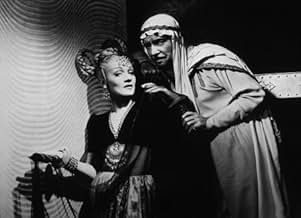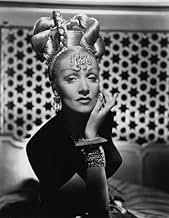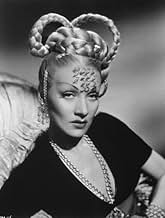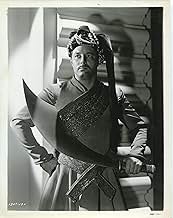AVALIAÇÃO DA IMDb
6,0/10
1,4 mil
SUA AVALIAÇÃO
Adicionar um enredo no seu idiomaIn ancient Baghdad, Hafiz the King of Beggars dreams of untold riches and of marrying his daughter to a real prince.In ancient Baghdad, Hafiz the King of Beggars dreams of untold riches and of marrying his daughter to a real prince.In ancient Baghdad, Hafiz the King of Beggars dreams of untold riches and of marrying his daughter to a real prince.
- Direção
- Roteiristas
- Artistas
- Indicado a 4 Oscars
- 1 vitória e 4 indicações no total
Eddie Abdo
- Aide to Mansur
- (não creditado)
- …
Jimmy Ames
- Major Domo
- (não creditado)
Morris Ankrum
- The Caliph's Messenger
- (não creditado)
Leslie Anthony
- Handmaiden
- (não creditado)
Lynn Arlen
- Handmaiden
- (não creditado)
Noble Blake
- Nubian Slave
- (não creditado)
Carla Boehm
- Handmaiden
- (não creditado)
Dick Botiller
- Aide to Mansur
- (não creditado)
- Direção
- Roteiristas
- Elenco e equipe completos
- Produção, bilheteria e muito mais no IMDbPro
Avaliações em destaque
This is not a bad movie, but it is not an important one. Made in the last decade of Ronald Colman's active career as a movie star, KISMET seems to be an odd choice for him. Normally he was playing English gentlemen types - Rudolph Rassendyll in THE PRISONER OF ZENDA, or Robert Conway in LOST HORIZON or Dick Helgar in THE LIGHT THAT FAILED. If he played Americans, they were the Supreme Court Candidate in THE TALK OF THE TOWN or the title character Boston Brahman in THE LATE GEORGE APLEY. Here he was playing the philosophical thief Hafiz of 11th Century Baghdad. An odd choice indeed.
To begin with, as he is playing an Arab, there was nothing physically "semitic" about Colman to suggest a citizen of Baghdad. However, the producers must have thought of him as a good example of a cultured type (Hafiz sprouts proverbs and examples of Middle Eastern wisdom), so he fit half the requirement. Still, it might have been better to have used someone who might have looked more like a citizen of the "fertile crescent". Robert Donat would have made a better choice.
Secondly, if they had to do a story about ancient Islam at it's zenith of glory and power, why did they choose KISMET? It is an old play by Edward Knobloch which was written about 1910 and became the favorite starring part for the then great stage character actor Otis Skinner.* In fact, Skinner did a film version of the play in the silent period. But while not the worst example of a well made piece of hokum, it remains hokum. Skinner was quite well identified with the central role, but he died in 1942. It may be that Paramount felt they could get away with this just because he was no longer around.
*Skinner's career, like so many of his contemporary stars like Richard Mansfield and Henry Irving can only be judged by snips and brief glimpses of their work - if they made an early silent film or even sound film (George M. Cohan in THE PHANTOM PRESIDENT comes to mind) we can see something of what they were like. Irving actually made surviving gramophone recordings of Shakespearean parts. In Skinner's case, most people who recall him at all today probably do so because Charlie Ruggles played him in the movie OUR HEARTS WERE YOUNG AND GAY which was based on a book by Skinner's daughter Cornelia Otis Skinner. If you can find the 1961 edition of the Encyclopedia Britannica, the article on "Make-up" had a page of photographs of Otis Skinner in a dozen roles, including Hajjj (the actual name of Hafiz's character - the real "Hafiz" is the greatest of Persia's poets).
Still the studio went to great lengths - they made it a color film (a rarity for Colman, by the way). They gave the two other best parts to the capable Edward Arnold as the evil Vizier, and to Marlene Dietrich as the Vizier's sexy (and bored) wife. This film reunited James Craig and Arnold (formerly together in THE DEVIL AND DANIEL WEBSTER) with Craig as the Caliph. Except for romancing Joy Page as Colman's daughter, Craig really has little to do here. He's a target for Arnold's ambitious murder plans. Old Harry Davenport is the wise old Chancellor - a comparative figure of good to the evil Arnold.
It's serviceable and no more. You watch KISMET and you won't be bored, but you will not be enthralled by it. Colman does try to bring some additional juice to Hafiz. When threatened with banishment he seems genuinely surprised, hurt, and horrified - like being told he will now be a fish out of water, although he can live anywhere else in the empire. There are also some humorous moments, such as the threatened plan to punish Colman (in this film he is threatened with punishment several times) by cutting off his hands - he was captured as a thief. His anticipated looks at this imprisoned, chained down fists are surprisingly amusing. But the screenplay keeps going from mock philosophy to comedy to romance to melodrama. The ride is made as smooth as possible, but it seems like it's on old fashioned back roads.
So, I will say the film can be watched - but stick to THE LATE GEORGE APLEY or RANDOM HARVEST or A DOUBLE LIFE or CHAMPAIGN FOR CAESAR to get a better glimpse at Colman's acting strengths. He was just treading water here.
To begin with, as he is playing an Arab, there was nothing physically "semitic" about Colman to suggest a citizen of Baghdad. However, the producers must have thought of him as a good example of a cultured type (Hafiz sprouts proverbs and examples of Middle Eastern wisdom), so he fit half the requirement. Still, it might have been better to have used someone who might have looked more like a citizen of the "fertile crescent". Robert Donat would have made a better choice.
Secondly, if they had to do a story about ancient Islam at it's zenith of glory and power, why did they choose KISMET? It is an old play by Edward Knobloch which was written about 1910 and became the favorite starring part for the then great stage character actor Otis Skinner.* In fact, Skinner did a film version of the play in the silent period. But while not the worst example of a well made piece of hokum, it remains hokum. Skinner was quite well identified with the central role, but he died in 1942. It may be that Paramount felt they could get away with this just because he was no longer around.
*Skinner's career, like so many of his contemporary stars like Richard Mansfield and Henry Irving can only be judged by snips and brief glimpses of their work - if they made an early silent film or even sound film (George M. Cohan in THE PHANTOM PRESIDENT comes to mind) we can see something of what they were like. Irving actually made surviving gramophone recordings of Shakespearean parts. In Skinner's case, most people who recall him at all today probably do so because Charlie Ruggles played him in the movie OUR HEARTS WERE YOUNG AND GAY which was based on a book by Skinner's daughter Cornelia Otis Skinner. If you can find the 1961 edition of the Encyclopedia Britannica, the article on "Make-up" had a page of photographs of Otis Skinner in a dozen roles, including Hajjj (the actual name of Hafiz's character - the real "Hafiz" is the greatest of Persia's poets).
Still the studio went to great lengths - they made it a color film (a rarity for Colman, by the way). They gave the two other best parts to the capable Edward Arnold as the evil Vizier, and to Marlene Dietrich as the Vizier's sexy (and bored) wife. This film reunited James Craig and Arnold (formerly together in THE DEVIL AND DANIEL WEBSTER) with Craig as the Caliph. Except for romancing Joy Page as Colman's daughter, Craig really has little to do here. He's a target for Arnold's ambitious murder plans. Old Harry Davenport is the wise old Chancellor - a comparative figure of good to the evil Arnold.
It's serviceable and no more. You watch KISMET and you won't be bored, but you will not be enthralled by it. Colman does try to bring some additional juice to Hafiz. When threatened with banishment he seems genuinely surprised, hurt, and horrified - like being told he will now be a fish out of water, although he can live anywhere else in the empire. There are also some humorous moments, such as the threatened plan to punish Colman (in this film he is threatened with punishment several times) by cutting off his hands - he was captured as a thief. His anticipated looks at this imprisoned, chained down fists are surprisingly amusing. But the screenplay keeps going from mock philosophy to comedy to romance to melodrama. The ride is made as smooth as possible, but it seems like it's on old fashioned back roads.
So, I will say the film can be watched - but stick to THE LATE GEORGE APLEY or RANDOM HARVEST or A DOUBLE LIFE or CHAMPAIGN FOR CAESAR to get a better glimpse at Colman's acting strengths. He was just treading water here.
More Arabian Nights stuff, this time emanating from the studio where the lion roared: according to the Internet Movie Database, there are twenty (count 'em) films that go by the name of KISMET and, although the Vincente Minnelli-Howard Keel musical version is the best-known of the lot, this earlier straight adaptation starring Ronald Colman and Marlene Dietrich is perhaps the best-regarded. For the record, I do have the former on VHS but won't have time to catch it just now and, of all the rest, I'm mostly interested in the 1930 German version (there was another one made in Hollywood the same year) which, like the film under review, was directed by William Dieterle! Speaking of which, I don't quite understand the reasoning of Warner Brothers (who have inherited DVD distribution rights to the MGM film library) behind recently releasing the 1955 version on this format on its own (so to speak, since it actually forms part of a Musical Collection) rather than coupled with the earlier version.
Aged 53, Ronald Colman still cuts a strikingly handsome figure (even when dressed as a beggar) and his silvery hairline is amusingly obscured by the most unseemly of turbans for all but one scene in the film's latter stages. Equally splendid-looking is his 43-year old German co-star who, in the film's most celebrated sequence that was, ironically, later cut for TV screenings because of its 'erotic' content(!), has her legs painted in gold for a veiled dance number before the court of evil Grand Vizier Edward Arnold and Colman (who dubs himself the King of Beggars by day but moonlights as a sovereign of a far-away land). Given the maturing age of the two leads, it's no wonder that two younger actors were recruited in the persons of James Craig (as the Caliph of Bagdad who likes to go incognito through the streets of his kingdom as a gardener's son) and the late Joy Page (Colman's secreted daughter); she had made a memorable screen debut in CASABLANCA (1942) and died earlier this year aged 83.
The cast is rounded up by Florence Bates (as Colman's nagging in-law), Harry Davenport (as Craig's wily adviser) and Hugh Herbert (as one of Colman's would-be comic-relief sidekicks). As was to be expected from Hollywood's premier studio, no expense was spared in bringing this opulent costumer to the screen including shooting in eye-filling Technicolor amidst impressively-constructed sets and this effort was rewarded by garnering the film four Academy Award nominations in that year's ceremony although, as had been the case (and would be again) with similar Oriental ventures, the nominees all went home empty-handed!
Aged 53, Ronald Colman still cuts a strikingly handsome figure (even when dressed as a beggar) and his silvery hairline is amusingly obscured by the most unseemly of turbans for all but one scene in the film's latter stages. Equally splendid-looking is his 43-year old German co-star who, in the film's most celebrated sequence that was, ironically, later cut for TV screenings because of its 'erotic' content(!), has her legs painted in gold for a veiled dance number before the court of evil Grand Vizier Edward Arnold and Colman (who dubs himself the King of Beggars by day but moonlights as a sovereign of a far-away land). Given the maturing age of the two leads, it's no wonder that two younger actors were recruited in the persons of James Craig (as the Caliph of Bagdad who likes to go incognito through the streets of his kingdom as a gardener's son) and the late Joy Page (Colman's secreted daughter); she had made a memorable screen debut in CASABLANCA (1942) and died earlier this year aged 83.
The cast is rounded up by Florence Bates (as Colman's nagging in-law), Harry Davenport (as Craig's wily adviser) and Hugh Herbert (as one of Colman's would-be comic-relief sidekicks). As was to be expected from Hollywood's premier studio, no expense was spared in bringing this opulent costumer to the screen including shooting in eye-filling Technicolor amidst impressively-constructed sets and this effort was rewarded by garnering the film four Academy Award nominations in that year's ceremony although, as had been the case (and would be again) with similar Oriental ventures, the nominees all went home empty-handed!
10Molly-31
William Dieterle directing, music by Harold Arlen (there's even a tiny bit of the Witch's Guard music at one point!), opulent sets and gorgeous costumes, Ronald Colman -- what more could anyone ask?
The film was very carefully crafted. Even the bit players -- especially Henry Davenport and Florence Bates -- were perfect. From the beginning, you are immersed in a magical world, an Iraq that died long ago, the Islam of Arabian Nights and Haroun el-Raschid, a romantic culture with its own philosophies and mysteries. Karsha foretelling the future with a sand reading, the muezzin and his apprentice singing the call to prayer, or the public bathing place that the rascals hide in, give the film a sense not only of unity and atmosphere but of meticulous attention to detail.
Dietrich's character was not Greek but Macedonian (like Alexander the Great, another blonde). I could have stood for more authenticity in her dance (especially after the Kraft girls who preceded her -- their Deva Dasi style dance *was* pretty authentic) and that gold paint was a little much. Still, the idea was that Jamilla was wild, and did unconventional things.
I do see where it could have been better. Craig in particular sounds jarringly "modern". But you forget that after a while. Modern films don't present this kind of idealism. We have to have everything brought down to sordid reality. A thing like this is good for you after too much "realism" gunk.
The film was very carefully crafted. Even the bit players -- especially Henry Davenport and Florence Bates -- were perfect. From the beginning, you are immersed in a magical world, an Iraq that died long ago, the Islam of Arabian Nights and Haroun el-Raschid, a romantic culture with its own philosophies and mysteries. Karsha foretelling the future with a sand reading, the muezzin and his apprentice singing the call to prayer, or the public bathing place that the rascals hide in, give the film a sense not only of unity and atmosphere but of meticulous attention to detail.
Dietrich's character was not Greek but Macedonian (like Alexander the Great, another blonde). I could have stood for more authenticity in her dance (especially after the Kraft girls who preceded her -- their Deva Dasi style dance *was* pretty authentic) and that gold paint was a little much. Still, the idea was that Jamilla was wild, and did unconventional things.
I do see where it could have been better. Craig in particular sounds jarringly "modern". But you forget that after a while. Modern films don't present this kind of idealism. We have to have everything brought down to sordid reality. A thing like this is good for you after too much "realism" gunk.
Often overshadowed these days by the musical version which came a decade later, this film by William Dieterle has the distinction of being one of the best examples of a 1940s Technicolor film there is. And with colour, no one shone out from the screen more than Marlene Dietrich. Here she is as Jamilla, garlanded in gold and looking positively luminous - her appearance in this movie alone would justify watching it.
Ronald Colman, that debonair English actor, plays the role of the beggar, Hafiz (which would be memorably played by Howard Keel in the musical). He's a little starchy and looks prematurely middle-aged, but he was always a very good actor, and here is no exception. James Craig is colourless as the Caliph but Edward Arnold and Hugh Herbert add humour as the Grand Vizier and Feisal.
The strength of this 'Kismet' though it definitely how it looks. It is how the films of the golden era were at their peak, and this version doesn't get shown on TV anywhere near enough.
Ronald Colman, that debonair English actor, plays the role of the beggar, Hafiz (which would be memorably played by Howard Keel in the musical). He's a little starchy and looks prematurely middle-aged, but he was always a very good actor, and here is no exception. James Craig is colourless as the Caliph but Edward Arnold and Hugh Herbert add humour as the Grand Vizier and Feisal.
The strength of this 'Kismet' though it definitely how it looks. It is how the films of the golden era were at their peak, and this version doesn't get shown on TV anywhere near enough.
To be bothered by he fact that all the principals of this movies were Western is to miss the point. This is a document of a given time and place (Hollywood in 1944). Ronald Coleman was born to play the part of the poetic beggar prince. Who could be better to declaim the bits of Omar Khayam in the script. It's a little like his take on Francois Villon in "If I Were King". Marlene Dietrich is magnificent as a Macedonian princess in the Grand Vizier's harem. She does a beautiful and seductive dance. Edward Arnold supplies real menace as the heavy just as he did in "Meet John Doe". The whole premise of a movie like this is naive and unhistorical but the production was so ambitious and sumptuous that it transcends that shortcoming.
Você sabia?
- CuriosidadesThe decision to paint Dietrich's legs gold was a last resort. Initially, they had made fine mesh tights for her, like chain-mail. It took several hours to close the links up the back using jeweler's pliers. However, after she was encased in the mesh, it was discovered she couldn't move, so they undid the tights and resorted to gold paint.
- Erros de gravaçãoRonald Colman's character eats with his left hand, which is taboo in Arabic culture.
- ConexõesFeatured in Quando Hollywood Dança (1985)
- Trilhas sonorasTell Me, Tell Me, Evening Star
(1944) (uncredited)
Music by Harold Arlen
Lyrics by E.Y. Harburg
Partially sung by Marlene Dietrich
Sung by Joy Page (dubbed by Doreen Tryden)
Principais escolhas
Faça login para avaliar e ver a lista de recomendações personalizadas
- How long is Kismet?Fornecido pela Alexa
Detalhes
- Data de lançamento
- País de origem
- Idioma
- Também conhecido como
- Oriental Dream
- Locações de filme
- Empresa de produção
- Consulte mais créditos da empresa na IMDbPro
Bilheteria
- Orçamento
- US$ 3.000.000 (estimativa)
- Tempo de duração1 hora 40 minutos
- Proporção
- 1.37 : 1
Contribua para esta página
Sugerir uma alteração ou adicionar conteúdo ausente



































